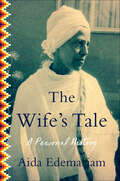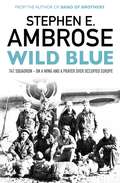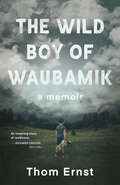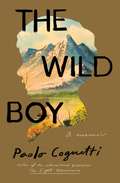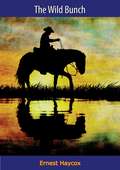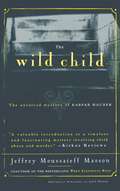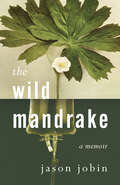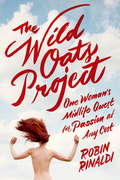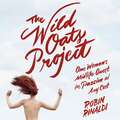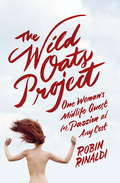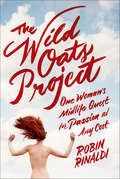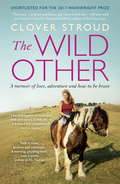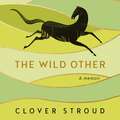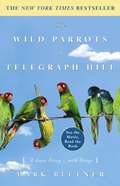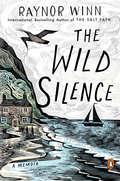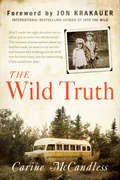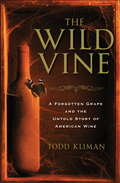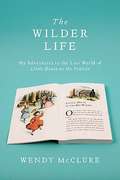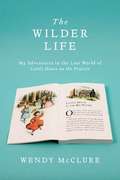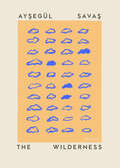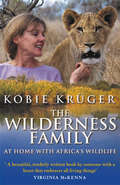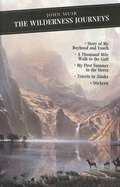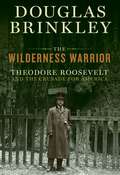- Table View
- List View
The Wife's Tale: A Personal History
by Aida EdemariamA Finalist for The Governor General’s Award for Nonfiction “The extraordinary memoir of a woman who lived through the cataclysmic events that shaped modern Ethiopian history. The narrative, which is lovingly and expertly put together by her granddaughter, is a window into a world that would otherwise be invisible to us.” — Abraham Verghese, author of Cutting for StoneIn this indelible memoir that recalls the life of her remarkable ninety-five-year old grandmother, Guardian journalist Aida Edemariam tells the story of modern Ethiopia—a nation that would undergo a tumultuous transformation from feudalism to monarchy to Marxist revolution to democracy, over the course of one century.Born in the northern Ethiopian city of Gondar in about 1916, Yetemegnu was married and had given birth before she turned fifteen. As the daughter of a socially prominent man, she also offered her husband, a poor yet gifted student, the opportunity to become an important religious leader.Over the next decades Yetemegnu would endure extraordinary trials: the death of some of her children; her husband’s imprisonment; and the detention of one of her sons. She witnessed the Fascist invasion of Ethiopia and the subsequent resistance, suffered Allied bombardment and exile from her city; lived through a bloody revolution and the nationalization of her land. She gained audiences with Emperor Haile Selassie I to argue for justice for her husband, for revenge, and for her children’s security, and fought court battles to defend her assets against powerful men. But sustained, in part, by her fierce belief in the Virgin Mary and in Orthodox Christianity, Yetemegnu survived. She even learned to read, in her sixties, and eventually made a pilgrimage to Jerusalem.Told in Yetemegnu’s enthralling voice and filled with a vivid cast of characters—emperors and empresses, priests and scholars, monks and nuns, archbishops and slaves, Marxist revolutionaries and wartime double agents—The Wife’s Tale introduces a woman both imperious and vulnerable; a mother, widow, and businesswoman whose deep faith and numerous travails never quashed her love of laughter, mischief and dancing; a fighter whose life was shaped by direct contact with the volatile events that transformed her nation.An intimate memoir that offers a panoramic view of Ethiopia’s recent history, The Wife’s Tale takes us deep into the landscape, rituals, social classes, and culture of this ancient, often mischaracterized, richly complex, and unforgettable land—and into the heart of one indomitable woman.
The Wild Blue: The Men and Boys Who Flew the B-24s over Germany 1944-45
by Stephen E. AmbroseThe very young men who flew the B24s over Germany in World War II against terrible odds were an exemplary band of brothers. In The Wild Blue, Stephen Ambrose recounts their extraordinary brand of heroism, skill, daring, and comradeship. Stephen Ambrose describes how the Army Air Forces recruited, trained, and chose those few who would undertake the most demanding and dangerous jobs in the war. These are the boys -- turned pilots, bombardiers, navigators, and gunners of the B24s -- who suffered over 50 percent casualties. Ambrose carries us along in the crowded, uncomfortable, and dangerous B24s as their crews fought to the death through thick, black, deadly flak to reach their targets and destroy the German war machine or else went down in flames. Twenty-two-year-old George McGovern who was to become a United States senator and a presidential candidate, flew thirty-five combat missions (all the Army would allow) and won the Distinguished Flying Cross. We meet him and his mates, his co-pilot killed in action, and crews of other planes -- many of whom did not come back. As Band of Brothers and Citizen Soldiers portrayed the bravery and ultimate victory of the American soldier from Normandy on to Germany, The Wild Blue makes clear the contribution these young men of the Army Air Forces stationed in Italy made to the Allied victory.
The Wild Boy of Waubamik: A Memoir
by Thom Ernst“An inspiring story of resilience, told with a vivid sense of character and humour.” —RICHARD CROUSE, CTV host and film criticFilm critic, writer, and broadcaster Thom Ernst chronicles his life growing up with an abusive father in rural Ontario.The residents of Waubamik know about the Wild Boy, a somewhat feral child, standing nearly naked in a rusty playground of weeds and discarded metal, clutching a headless doll. They know the boy has been plucked from poverty and resettled into a middle-class family. But they don’t know that something worse awaits him there.This is the story of a system that failed, a community that looked the other way, and a family that kept silent. It is also a record of the popular culture of the 1960s — a powerful set of myths that kept a boy comforted. But ultimately, The Wild Boy of Waubamik is a story of triumph, of a man who grew up to become a film critic and broadcaster despite his abusive childhood. It reminds us that life, even at its darkest, can surprise us with moments of joy and hope and dreams for the future.
The Wild Boy: A Memoir
by Paolo CognettiA young man escapes his painful past by retreating to the rustic comfort of the Italian Alps in this gorgeously wrought memoir from the internationally bestselling author of the “exquisite” (Annie Proulx) novel The Eight Mountains.When life in the city becomes too overwhelming for Paolo, he decides to take refuge high in the Italian mountains. Returning to the breathtaking Valle d’Aosta—known for its snowcapped mountain peaks—after a decade’s absence, he rediscovers a simpler life and develops deep human connections with two neighbors. In this stunning landscape, he begins to take stock of his life and consider what he truly values. With lyrical and evocative prose, The Wild Boy is a testament to the power of the natural world, the necessity of an ever-questioning mind, and the resilience of the human spirit.
The Wild Bunch
by Ernest HaycoxBLOOD JUSTICEFrank Goodnight set out to track down Theo McSween—the man who had run off with his pretty sister and left her high and dry. He had been on McSween’s trail for weeks when he rode into Sherman City, Wyoming, a tough town at the base of the Owlhom hills, on a hunch the varmint was hidin’ up there with the Wild Bunch, a gang of outlaws Who been preying on prideful ranchers. While Goodnight sampled the rotgut at the local saloon, the Wild Bunch rode into town with their Colts ablazin’ and suddenly he was a stranger caught plumb in the middle of a range war. But he survived, dodging the hot lead and even gettin’ a good look at his man ridin’ with that bunch of gun toughs. All he could think of now was putting McSween six feet under, but that would have to wait a spell. He wanted the chance to meet that scummy nightrider alone and man to man—and make him sweat blood!
The Wild Child: The Unsolved Mystery of Kaspar Hauser
by Jeffrey Moussaieff MassonKept in a dungeon for his entire childhood, Kaspar Hauser appeared in Nuremberg, Germany, in 1828 at age sixteen, barely able to walk or talk. When he was killed in 1833, his true identity and the motives for his unsolved murder became the subjects of intense speculation. This provocative essay sheds new light on this mystery and delves into fundamental questions about the long-term effects of child abuse.
The Wild Mandrake: A Memoir
by Jason JobinOn the cusp of adulthood, a young writer’s life is stalled as he faces cancer that keeps coming back.Doctors used to tell him he was cured. That was a long time ago. Ever since he first left home at age nineteen, writer Jason Jobin has had cancer. Every five years, like clockwork, it relapses, and yet he always pulls through, surrounded by friends and family but isolated by illness. Chemotherapy, surgeries, radiation — these persist, but they aren’t the milestones of his life. They can’t be, he won’t let them be.From helicoptering into the Yukon backcountry to teaching in an elite writing program, Jason strives to enter adulthood with some normalcy, but his is the life of “a special case.” And he does live. He lives working at a deli for minimum wage as his students come down the hill to shop and ask what he’s doing there. He lives measuring out nausea pills and benzos while his roommates drink and smoke and party. He lives lying to girlfriends about past diagnoses because what can you say? What do you build on rubble? He lives high and low and in between. Again he is sick, again he is cured. It’s miraculous. A great gift. But never enough.Told in short glimpses, this story redefines what it means to survive. Jobin brings together the illuminated moments of loss and joy as he navigates chronic illness and builds from it something new and wildly unexpected.
The Wild Oats Project
by Robin RinaldiWhat if for just one year you explored everything you'd wondered about sex but hadn't tried? The project was simple: An attractive, successful magazine journalist, Robin Rinaldi, would move into a San Francisco apartment, join a dating site, and get laid. Never mind that she already owned a beautiful flat a few blocks away, that she was forty-four, or that she was married to a man she'd been in love with for eighteen years. What followed--a year of sex, heartbreak, and unexpected revelation--is the topic of this riveting memoir, The Wild Oats Project. An open marriage was never one of Rinaldi's goals--her priority as she approached midlife was to start a family. But when her husband insisted on a vasectomy, she decided that she could remain married only on her own terms. If I can't have children, she told herself, then I'm going to have lovers. During the week she would live alone, seduce men (and women), attend erotic workshops, and partake in wall-banging sex. On the weekends, she would go home and be a wife. At a time when the bestseller lists are topped by books about eroticism and the shifting roles of women, this brave memoir explores how our sexuality defines us--and it delivers the missing link: an everywoman's account of sex. Combining the strong literary voice of Cheryl Strayed's Wild with the adventurousness of Elizabeth Gilbert's Eat, Pray, Love, The Wild Oats Project challenges our sensibilities and evokes the delicate balance between loving others and staying true to oneself.
The Wild Oats Project
by Robin RinaldiThe project was simple: Robin Rinaldi, a successful magazine journalist, would move into a San Francisco apartment, join a dating site, and get laid. Never mind that she already owned a beautiful flat a few blocks away, that she was forty-four, or that she was married to a man she'd been in love with for eighteen years. What followed-a year of abandon, heartbreak, and unexpected revelation-is the topic of this riveting memoir, The Wild Oats Project.Monogamous and sexually cautious her entire adult life, Rinaldi never planned on an open marriage -her priority as she approached midlife was to start a family. But when her husband insisted on a vasectomy, something snapped. If I'm not going to have children, she told herself, then I'm going to have lovers. During the week she would live alone, seduce men (and women), attend erotic workshops, and partake in wall-banging sex. On the weekends, she would go home and be a wife. Her marriage provided safety and love, but she also needed passion, and for that she was willing to go outside of it.At a time when the bestseller lists are topped by books about eroticism and the shifting roles of women, this brave, brutally honest memoir explores how our sexuality defines us, how it relates to maternal longing, and how we all must walk the line between loving others and staying true to ourselves. Like the most searing memoirs-Cheryl Strayed's Wild, Mary Karr's The Liars' Club-The Wild Oats Project challenges our sensibilities, rendering truths we all can recognize but which few would dare write down.(P)2015 Macmillan Audio
The Wild Oats Project: One Woman's Midlife Quest For Passion At Any Cost
by Robin RinaldiA testament to how far feminism has taken us all...her search for sexual nirvana is hugely refreshing. The Sunday Times A revealing...quest for sexual meaning The Independent The project was simple: Robin Rinaldi, a successful magazine journalist, would move into a San Francisco apartment, join a dating site, and get laid. Never mind that she already owned a beautiful flat a few blocks away, that she was forty-four, or that she was married to a man she'd been in love with for eighteen years. What followed-a year of abandon, heartbreak, and unexpected revelation-is the topic of this riveting memoir, The Wild Oats Project.Monogamous and sexually cautious her entire adult life, Rinaldi never planned on an open marriage -her priority as she approached midlife was to start a family. But when her husband insisted on a vasectomy, something snapped. If I'm not going to have children, she told herself, then I'm going to have lovers. During the week she would live alone, seduce men (and women), attend erotic workshops, and partake in wall-banging sex. On the weekends, she would go home and be a wife. Her marriage provided safety and love, but she also needed passion, and for that she was willing to go outside of it.At a time when the bestseller lists are topped by books about eroticism and the shifting roles of women, this brave, brutally honest memoir explores how our sexuality defines us, how it relates to maternal longing, and how we all must walk the line between loving others and staying true to ourselves. Like the most searing memoirs-Cheryl Strayed's Wild, Mary Karr's The Liars' Club-The Wild Oats Project challenges our sensibilities, rendering truths we all can recognize but which few would dare write down.
The Wild Oats Project: One Woman's Midlife Quest for Passion at Any Cost
by Robin RinaldiWhat if for just one year you let desire call the shots?The project was simple: Robin Rinaldi, a successful magazine journalist, would move into a San Francisco apartment, join a dating site, and get laid. Never mind that she already owned a beautiful flat a few blocks away, that she was forty-four, or that she was married to a man she'd been in love with for eighteen years. What followed—a year of abandon, heartbreak, and unexpected revelation—is the topic of this riveting memoir, The Wild Oats Project.Monogamous and sexually cautious her entire adult life, Rinaldi never planned on an open marriage—her priority as she approached midlife was to start a family. But when her husband insisted on a vasectomy, something snapped. If I'm not going to have children, she told herself, then I'm going to have lovers. During the week, she would live alone, seduce men (and women), attend erotic workshops, and have wall-banging sex. On the weekends, she would go home and be a wife. Her marriage provided safety and love, but she also needed passion, and she was willing to go outside her marriage to find it.At a time when the bestseller lists are topped by books about eroticism and the shifting roles of women, this brave, brutally honest memoir explores how our sexuality defines us, how it relates to maternal longing, and how we must walk the line between loving others and staying true to ourselves. Like the most searing memoirs, The Wild Oats Project challenges our sensibilities, yielding truths that we all can recognize but that few would dare write down.
The Wild Other: A memoir of love, adventure and how to be brave
by Clover StroudSHORTLISTED FOR THE WAINWRIGHT PRIZE'Extraordinary, and a painful but invigorating read. I've never met anyone who has read it and doesn't rank it as one of their favourite books.' Dolly Alderton'This story - so fierce and brave and visceral and raw - will stay with me forever. Clover Stroud is a force of nature, and a woman who is fearless in the face of life and death. I loved it.' Elizabeth Gilbert, author of Eat Pray Love'There is so much richly evoked life here... beautifully written.' Cathy Rentzenbrink, The Times'This redemptive memoir will steal your heart; it will return it bruised but emboldened.' Mail on Sunday'I have huge admiration for the spirit of this memoir, and its author: full of heart, bravery and adventure. A moving, gripping read.' Amy Liptrot, author of The OutrunClover Stroud grew up in rural Wiltshire surrounded by animals and family. When she was just sixteen her adored mother had a horrific riding accident which left her permanently brain-damaged, and suddenly Clover was left to fend for herself. She embarked on an extraordinary journey to heal her broken heart, courting men and danger through two marriages and five children.The Wild Other is a grippingly honest account of love, sex and travelling to the darkest edges of human experience and back again. Powerful and deeply emotional, this is the story of an extraordinary life lived at its fullest.
The Wild Other: A memoir of love, adventure and how to be brave
by Clover StroudSHORTLISTED FOR THE WAINWRIGHT PRIZE'Extraordinary, and a painful but invigorating read. I've never met anyone who has read it and doesn't rank it as one of their favourite books.' Dolly Alderton'This story - so fierce and brave and visceral and raw - will stay with me forever. Clover Stroud is a force of nature, and a woman who is fearless in the face of life and death. I loved it.' Elizabeth Gilbert, author of Eat Pray Love'There is so much richly evoked life here... beautifully written.' Cathy Rentzenbrink, The Times'This redemptive memoir will steal your heart; it will return it bruised but emboldened.' Mail on Sunday'I have huge admiration for the spirit of this memoir, and its author: full of heart, bravery and adventure. A moving, gripping read.' Amy Liptrot, author of The OutrunClover Stroud grew up in rural Wiltshire surrounded by animals and family. When she was just sixteen her adored mother had a horrific riding accident which left her permanently brain-damaged, and suddenly Clover was left to fend for herself. She embarked on an extraordinary journey to heal her broken heart, courting men and danger through two marriages and five children.The Wild Other is a grippingly honest account of love, sex and travelling to the darkest edges of human experience and back again. Powerful and deeply emotional, this is the story of an extraordinary life lived at its fullest.
The Wild Other: A memoir of love, adventure and how to be brave
by Clover StroudClover Stroud's idyllic childhood in rural England was shattered when a horrific riding accident left her mother permanently brain-damaged. Just sixteen, she embarked on a journey to find the sense of home that had been so savagely broken. Travelling from gypsy camps in Ireland, to the rodeos of west Texas and then to Russia's war-torn Caucasus, Clover eventually found her way back to England's lyrical Vale of the White Horse.The Wild Other is a grippingly honest account of love, loss, family and the healing strength of nature. Powerful and deeply emotional, this is the story of an extraordinary life lived at its fullest.(P) 2017 Hodder & Stoughton
The Wild Parrots of Telegraph Hill: A Love Story ... with Wings
by Mark BittnerTrue story of the flock of wild parrots who live in San Francisco's Telegraph Hill, and the man who became a local expert on them. When Judith Irving made a documentary about Mark and the parrots, his life took a surprising turn.
The Wild Silence: A Memoir
by Raynor WinnAN INTERNATIONAL BESTSELLERThe incredible follow-up to the international bestseller The Salt Path, a story of finding your way back home.Nature holds the answers for Raynor and her husband Moth. After walking 630 homeless miles along The Salt Path, living on the windswept and wild English coastline; the cliffs, the sky and the chalky earth now feel like their home. Moth has a terminal diagnosis, but together on the wild coastal path, with their feet firmly rooted outdoors, they discover that anything is possible.Now, life beyond The Salt Path awaits and they come back to four walls, but the sense of home is illusive and returning to normality is proving difficult - until an incredible gesture by someone who reads their story changes everything. A chance to breathe life back into a beautiful farmhouse nestled deep in the Cornish hills; rewilding the land and returning nature to its hedgerows becomes their saving grace and their new path to follow. The Wild Silence is a story of hope triumphing over despair, of lifelong love prevailing over everything. It is a luminous account of the human spirit's connection to nature, and how vital it is for us all.
The Wild Truth: The Untold Story Of Sibling Survival
by Carine MccandlessIn the more than twenty years since the body of Chris McCandless was discovered in the wilds of Alaska, his spellbinding story has captivated millions who have either read Jon Krakauer's iconic Into the Wild or seen Sean Penn's acclaimed film of the same name.And yet, only one person has truly understood what motivated Chris's unconventional decision to forsake his belongings, abandon his family, and embrace the harsh wilderness. In The Wild Truth, his beloved sister Carine McCandless finally provides a deeply personal account of the many misconceptions about Chris, revealing the truth behind his fateful journey while sharing the remarkable details of her own.Exposing the dark reality that existed behind the McCandless's seemingly idyllic home in the suburbs of Washington, D.C., Carine details a violent home life, one where both parents manipulated the truth about a second family--a deception that pushed Chris over the edge and set the stage for his willing departure into the wild. And though he cut off all family ties, Carine understood--through their indelible bond and some cryptic communication--what Chris was seeking.This understanding, kept under wraps for years as Carine struggled to maintain a relationship with her parents, now comes to spectacular light in the pages of The Wild Truth. In the decades since Chris's death, Carine and her half-siblings have come together to find their own truth and build their own beauty in his absence. In each other, they've found absolution, just as Chris found absolution in the wild before he died.Beautiful and haunting, told with candor and heartbreaking insight, The Wild Truth presents a man the world only thought they knew--and the sister who has finally found redemption in sharing the rest of their story.
The Wild Vine: A Forgotten Grape and the Untold Story of American Wine
by Todd KlimanA rich romp through untold American history featuring fabulous characters, The Wild Vineis the tale of a little-known American grape that rocked the fine-wine world of the nineteenth century and is poised to do so again today. Author Todd Kliman sets out on an epic quest to unravel the mystery behind Norton, a grape used to make a Missouri wine that claimed a prestigious gold medal at an international exhibition in Vienna in 1873. At a time when the vineyards of France were being ravaged by phylloxera, this grape seemed to promise a bright future for a truly American brand of wine-making, earthy and wild. And then Norton all but vanished. What happened? The narrative begins more than a hundred years before California wines were thought to have put America on the map as a wine-making nation and weaves together the lives of a fascinating cast of renegades. We encounter the suicidal Dr. Daniel Norton, tinkering in his experimental garden in 1820s Richmond, Virginia. Half on purpose and half by chance, he creates a hybrid grape that can withstand the harsh New World climate and produce good, drinkable wine, thus succeeding where so many others had failed so fantastically before, from the Jamestown colonists to Thomas Jefferson himself. Thanks to an influential Long Island, New York, seed catalog, the grape moves west, where it is picked up in Missouri by German immigrants who craft the historic 1873 bottling. Prohibition sees these vineyards burned to the ground by government order, but bootleggers keep the grape alive in hidden backwoods plots. Generations later, retired Air Force pilot Dennis Horton, who grew up playing in the abandoned wine caves of the very winery that produced the 1873 Norton, brings cuttings of the grape back home to Virginia. Here, dot-com-millionaire-turned-vintner Jenni McCloud, on an improbable journey of her own, becomes Norton's ultimate champion, deciding, against all odds, to stake her entire reputation on the outsider grape. Brilliant and provocative,The Wild Vineshares with readers a great American secret, resuscitating the Norton grape and its elusive, inky drink and forever changing the way we look at wine, America, and long-cherished notions of identity and reinvention.
The Wilder Life
by Wendy McclureFor anyone who has ever wanted to step into the world of a favorite book, here is a pioneer pilgrimage, a tribute to Laura Ingalls Wilder, and a hilarious account of butter-churning obsession. Wendy McClure is on a quest to find the world of beloved Little House on the Prairie author Laura Ingalls Wilder-a fantastic realm of fiction, history, and places she's never been to, yet somehow knows by heart. She retraces the pioneer journey of the Ingalls family- looking for the Big Woods among the medium trees in Wisconsin, wading in Plum Creek, and enduring a prairie hailstorm in South Dakota. She immerses herself in all things Little House, and explores the story from fact to fiction, and from the TV shows to the annual summer pageants in Laura's hometowns. Whether she's churning butter in her apartment or sitting in a replica log cabin, McClure is always in pursuit of "the Laura experience. " Along the way she comes to understand how Wilder's life and work have shaped our ideas about girlhood and the American West. The Wilder Life is a loving, irreverent, spirited tribute to a series of books that have inspired generations of American women. It is also an incredibly funny first-person account of obsessive reading, and a story about what happens when we reconnect with our childhood touchstones-and find that our old love has only deepened. .
The Wilder Life
by Wendy McclureFor anyone who has ever wanted to step into the world of a favorite book, here is a pioneer pilgrimage, a tribute to Laura Ingalls Wilder, and a hilarious account of butter-churning obsession. Wendy McClure is on a quest to find the world of beloved Little House on the Prairie author Laura Ingalls Wilder-a fantastic realm of fiction, history, and places she's never been to, yet somehow knows by heart. She retraces the pioneer journey of the Ingalls family- looking for the Big Woods among the medium trees in Wisconsin, wading in Plum Creek, and enduring a prairie hailstorm in South Dakota. She immerses herself in all things Little House, and explores the story from fact to fiction, and from the TV shows to the annual summer pageants in Laura's hometowns. Whether she's churning butter in her apartment or sitting in a replica log cabin, McClure is always in pursuit of "the Laura experience." Along the way she comes to understand how Wilder's life and work have shaped our ideas about girlhood and the American West. The Wilder Life is a loving, irreverent, spirited tribute to a series of books that have inspired generations of American women. It is also an incredibly funny first-person account of obsessive reading, and a story about what happens when we reconnect with our childhood touchstones-and find that our old love has only deepened.
The Wilder Life: My Adventures in the Lost World of Little House on the Prairie
by Wendy McclureFor anyone who has ever wanted to step into the world of a favorite book, here is a pioneer pilgrimage, a tribute to Laura Ingalls Wilder, and a hilarious account of butter-churning obsession. Wendy McClure is on a quest to find the world of beloved Little House on the Prairie author Laura Ingalls Wilder--a fantastic realm of fiction, history, and places she's never been to, yet somehow knows by heart. She retraces the pioneer journey of the Ingalls family, looking for the Big Woods among the medium trees in Wisconsin, wading in Plum Creek, and enduring a prairie hailstorm in South Dakota. She immerses herself in all things Little House,and explores the story from fact to fiction, and from the TV shows to the annual summer pageants in Laura's hometowns. Whether she's churning butter in her apartment or sitting in a replica log cabin, McClure is always in pursuit of "the Laura experience." Along the way she comes to understand how Wilder's life and work have shaped our ideas about girlhood and the American West. The Wilder Life is a loving, irreverent, spirited tribute to a series of books that have inspired generations of American women. It is also an incredibly funny first-person account of obsessive reading, and a story about what happens when we reconnect with our childhood touchstones--and find that our old love has only deepened.
The Wilderness (Undelivered Lectures)
by Ayşegül SavaşA deeply felt chronicle into the wilderness of the first forty days of new motherhood. In the final weeks of her pregnancy, Ayşegül Savaş becomes fascinated by the mythology around the first forty days after giving birth, and the invisible beings that are said to surround the mother. “In Turkish, we speak of extracting the forty days, like a sort of exorcism. My grandmothers assure me that it will all get better after forty days are out.” A friend lends a book that suggests forty days of rest and fortifying broths and avoiding wind and cold. In Judaism, Christianity, and Islam, forty days are seen as a period of trial and transformation. They are often journeys into the wilderness and “its vast and unruly territories.” When the baby arrives, Savaş charts her own path into the wilderness of new motherhood—a space of contradiction, of chaos and care, mothering and being mothered. “What is the trial of the postpartum crossing?” writes Savaş. “Where will mother and child emerge once they have left the wild?”
The Wilderness Family
by Kobie KrugerWhen Kobie Krüger, her game-ranger husband and their three young daughters moved to one of the most isolated corners of the world - a remote ranger station in the Mahlangeni region of South Africa's vast Kruger National Park - she might have worried that she would become engulfed with loneliness and boredom. Yet, for Kobie and her family, the seventeen years spent in this spectacularly beautiful park proved to be the most magical - and occasionally the most hair-raising - of their lives.Kobie recounts their enchanting adventures and extraordinary experiences in this vast reserve - a place where, bathed in golden sunlight, hippos basked in the glittering waters of the Letaba River, storks and herons perched along the shoreline, and fruit bats hung in the sausage trees.But as the Krugers settled in, they discovered that not all was peace and harmony. They soon became accustomed to living with the unexpected: the sneaky hyenas who stole blankets and cooking pots, the sinister-looking pythons that slithered into the house, and the usually placid elephants who grew foul-tempered in the violent heat of the summer. And one terrible day, a lion attacked Kobus in the bush and nearly killed him.Yet nothing prepared the Krugers for their greatest adventure of all, the raising of an orphaned prince, a lion cub who, when they found him, was only a few days old and on the verge of death. Reared on a cocktail of love and bottles of fat-enriched milk, Leo soon became an affectionate, rambunctious and adored member of the fmaily. It is the rearing of this young king, and the hilarious endeavours to teach him to become a 'real' lion who could survive with his own kind in the wild, that lie at the heart of this endearing memoir. It is a memoir of a magical place and time that can never be recaptured.
The Wilderness Journeys: My Boyhood And Youth - First Summer In The Sierra - 1000 Mile Walk - Stickeen - Travels In Alaska (Canongate Classics #Vol. 67)
by John MuirFive works by the naturalist considered the father of the modern conservation movement, documenting the unspoiled beauty of nineteenth-century America. When we try to pick out anything by itself, we find it hitched to everything else in the universe. —John Muir, My First Summer in the Sierra The name of John Muir has come to stand for the protection of wild land and wilderness in both America and Britain. Born in Scotland in 1838, Muir is famed as the father of American conservation and the founder of the Sierra Club. This collection, including the rarely seen Stickeen, presents the finest of Muir&’s writings, painting a portrait of a man whose generosity, passion, and vision are an inspiration to this day. Combining acute observation, amusing anecdotes, and a sense of inner discovery, Muir&’s writings of his travels though some of the greatest landscapes on Earth, including the Carolinas, Florida, Alaska, and those lands that were to become the great National Parks of Yosemite and the Sierra Valley, raise an awareness of nature to a spiritual dimension. Includes an introduction by Graham White
The Wilderness Warrior: Theodore Roosevelt and the Crusade for America
by Douglas Brinkley<P>In this groundbreaking epic biography, Douglas Brinkley draws on never-before-published materials to examine the life and achievements of our "naturalist president." <P>By setting aside more than 230 million acres of wild America for posterity between 1901 and 1909, Theodore Roosevelt made conservation a universal endeavor. This crusade for the American wilderness was perhaps the greatest U.S. presidential initiative between the Civil War and World War I. Roosevelt's most important legacies led to the creation of the U.S. Fish and Wildlife Service and passage of the Antiquities Act in 1906. His executive orders saved such treasures as Devils Tower, the Grand Canyon, and the Petrified Forest. <P>Tracing the role that nature played in Roosevelt's storied career, Brinkley brilliantly analyzes the influence that the works of John James Audubon and Charles Darwin had on the young man who would become our twenty-sixth president. With descriptive flair, the author illuminates Roosevelt's bird watching in the Adirondacks, wildlife obsession in Yellowstone, hikes in the Blue Ridge Mountains, ranching in the Dakota Territory, hunting in the Big Horn Mountains, and outdoor romps through Idaho and Wyoming. <P>He also profiles Roosevelt's incredible circle of naturalist friends, including the Catskills poet John Burroughs, Boone and Crockett Club cofounder George Bird Grinnell, forestry zealot Gifford Pinchot, buffalo breeder William Hornaday, Sierra Club founder John Muir, U.S. Biological Survey wizard C. Hart Merriam, Oregon Audubon Society founder William L. Finley, and pelican protector Paul Kroegel, among many others. He brings to life hilarious anecdotes of wild-pig hunting in Texas and badger saving in Kansas, wolf catching in Oklahoma and grouse flushing in Iowa. Even the story of the teddy bear gets its definitive treatment. <P>Destined to become a classic, this extraordinary and timeless biography offers a penetrating and colorful look at Roosevelt's naturalist achievements, a legacy now more important than ever. Raising a Paul Revere-like alarm about American wildlife in peril--including buffalo, manatees, antelope, egrets, and elk--Roosevelt saved entire species from probable extinction. <P>As we face the problems of global warming, overpopulation, and sustainable land management, this imposing leader's stout resolution to protect our environment is an inspiration and a contemporary call to arms for us all. <P><b>A New York Times Bestseller</b>
